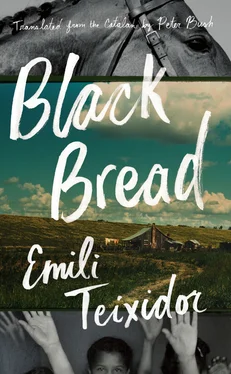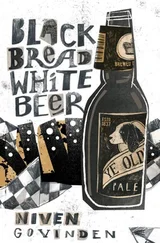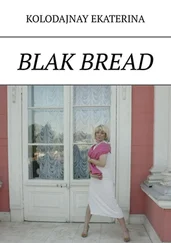I wondered rather apprehensively whether I too wasn’t fated to join this select group of the chosen few marked out by their difference. On the one hand I was attracted by the idea, on the other, I was afraid I’d be unable to behave like them — my models — with similar dignity and elegance, unable to bear the suffering or hardships with the strength they displayed when they welcomed their pain, like the village lads who on Saint John’s Eve walked barefoot across the embers of fires lit a while before and never complained, always smiled, and never burnt themselves.
Father Tafalla turned up one afternoon after lunch, at siesta time, and they seemed to be expecting his visit, as if he’d been invited a couple of days before. He was accompanied by another old Saint Camillus friar who said hello to us all and then, on the excuse of being behind with his prayers, walked up and down the cherry tree path, gripping his breviary. The Saint Camillus Superior sat down in the kitchen for a minute and then went up to the gallery to the sitting room with Dad Quirze and Uncle Bernat, who helped Grandmother up. Aunt Ció followed. Before leaving the kitchen, Uncle Bernat told Cry-Baby, Quirze and me: “You can go and play in the barn or the fruit orchard, because we’ve got work to do. And let us know if you see anyone coming.”
Quirze muttered, as if to complain about his deliberate exclusion from the meeting they were about to begin: “You want us to go to the barn in this heat!”
“Go wherever you want,” he replied, “but don’t get in our way.”
Cry-Baby and I climbed up the plum tree and Quirze called the dogs and went into the stables. Quirze had stopped playing with us. Cry-Baby and I took over the branch at the top of the tree our cousin had abandoned. It was the highest and strongest and the best place for watching the goings-on of the grownups in the gallery, Dad Quirze, Bernat and Father Tafalla, seated around Grandmother’s armchair and Aunt Ció coming in and out with glasses and jugs of water with honey and lemon. We couldn’t hear a word of what they were saying and their gestures weren’t expressive or dramatic enough for us to guess the subject of their conversation. Cry-Baby and I were quiet, our eyes glued to the gallery, until eventually she said: “They’re talking about Aunt Enriqueta.”
“How do you know?”
“Because Aunt Ció told me this morning that Father Tafalla would come this afternoon and bring regards from my father.”
I was taken aback for a moment. What was the connection between those two things? I sometimes felt my cousin hadn’t a clue.
“What do you mean?”
“Aunt Enriqueta had asked how my father managed to cross the mountains and hide in France. She and her novice want to do the same.”
“How do you know? Who told you?”
“Grandmother told me last night in bed, before we went to sleep.”
“What else did she tell you?”
“That I should be ready too, because depending on how things go, the three of us might go to France, with my father. She says he’s expecting us.”
“The three of us? You mean you, Aunt Enriqueta and the young friar?”
Cry-Baby nodded.
“But she said,” she continued, “it’s more than likely I would cross the border with a…I don’t remember what she said, a mountain ranger or guide or smuggler, a priest who’s a friend of Father Tafalla and Grandfather Hand. During the war the priest learned how to ferry people to the other side, because he had to do it time and again to save the lives of priests and nuns they were planning to execute, though he’s stopped doing it now and is the priest in a small village church near Andorra, but he’d do us this favour out of friendship for Father Tafalla and Grandfather Hand, who’ve become close friends since the war.”
I glanced at Cry-Baby and was intrigued. She knew more than I gave her credit for. We all thought she was gormless when she wasn’t. I was pleased she seemed more alert as I’d already begun to regret I’d be moving a long way from her, especially because I thought she always seemed so hapless, and the notion that she’d learned to cope by herself meant going our different ways didn’t seem so upsetting.
“You’ll have to learn French,” I said, testing how resilient she was. “Where will you go to school in France? If you don’t know French, nobody will understand you.”
“My father didn’t understand a word and he’s not suffered as a result, and Mother’s been living there for some time and nobody’s ever said they don’t understand her or that she’s having a difficult time.”
I was surprised by my memories of her mother. They never say how she’s faring, I thought. That was another family story, or rather, family mystery they never fully explained. Would Cry-Baby be all right with her mother in France? In order to move the conversation away from her mother that I guessed was dangerous territory, I said: “At the village school, with the priest, we read a story called La chèvre de Monsieur Seguin , and it was easy to understand. French is written one way and read another…”
While I spoke, I evoked the fantasy of a France that was within hand’s reach, just around the corner from the farm, yet so different, or so people said, a country of freedom and a haven for all fugitives and people on the run, a land of priest-eaters and stern-minded, arrant Republicans, of freedom, equality and liberty, Grandmother sometimes repeated, and I’d even think the air was cleaner there, and life easier, and people better behaved, and I could already imagine my Cry-Baby transformed into a distinguished mademoiselle , with fairer hair and bluer eyes, transformed into a citizen of France in the centre of a little box lined with pink silk that was liberal and welcoming, la douce France . I was happy for her sake, she deserved that, in fact she was already French before she crossed the border, simply because she was so different, tactful, free, and always ready to please. I’d hunt her out some day, I didn’t know when, as soon as I could flee this horrible country that forced people to change family and flee shamefully, stealthily, on foot, under cover of darkness like thieves or murderers.
Cry-Baby sat on the trunk and said: “Look, they’re leaving already.”
Father Tafalla, Bernat and Quirze had got to their feet and were talking around the bench where Grandmother was sat. Aunt Ció was waiting for them by the sitting-room door. A couple of jumps and Cry-Baby and I were on the ground and rushing over to the front-door. Meanwhile, Aunt Ció leaned over the balustrade and shouted: “Children, come and say goodbye to Father Tafalla!”
We waited by the entrance because the grownups came downstairs very slowly, still tying up what we imagined must be the final threads in their conversation.
“I didn’t mention the ex-cloistering of Xavier because she wouldn’t understand,” said Father Tafalla.
“I wouldn’t be so sure,” protested Aunt Ció, “at her age, she understands everything. But, you’re right, it’s better if she doesn’t hear the details. She will suffer less.”
After a silence, Aunt Ció continued: “She found work straight away. And he says he will too and soon, as a nurse, or a teacher in a local private academy. They’ve been lucky. They’re renting a flat that relatives of his are subletting.”
The last steps of the stairs weren’t hidden by the wall with the mirror, the second they saw us, the Superior of Saint Camillus beamed and lifted his arms up as if he was going to bless us.
“Here they are!” he exclaimed, as if he’d not realized his arrival had been the reason why we’d been banished. “Our two travellers, our two students.”
Dad Quirze and Uncle Bernat both stooped to kiss the Superior’s hand in farewell and the Saint Camillus Superior smiled, acknowledging their gesture as he placed his hand on our heads.
Читать дальше












